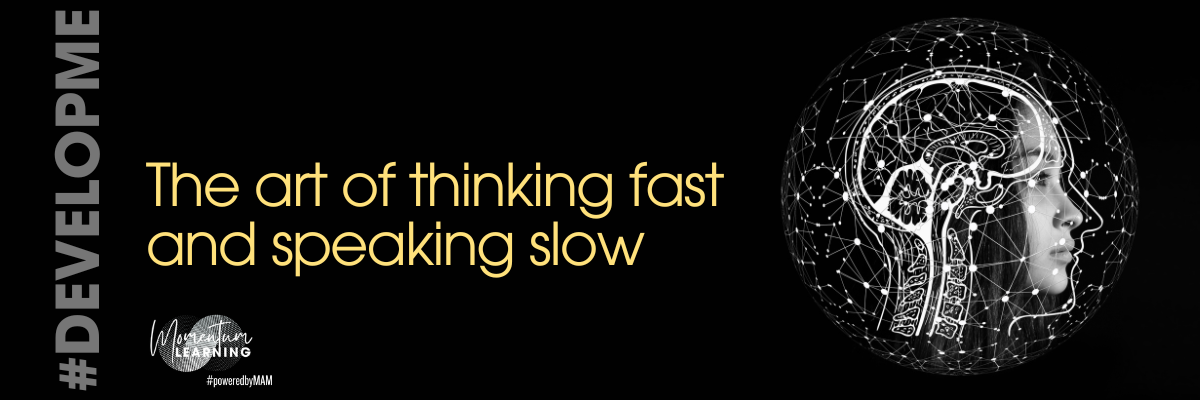
The art of thinking fast and speaking slow
Thinking on your feet is a vital skill for a leader. Even more so when under pressure.
Being able to manage competing information, sense-make, synthesise and strategise, whilst also humaning are vital skills in any leader's kete.
Mary-Anne Murphy
Thinking on your feet is a vital skill for a leader. Even more so when under pressure.
Being able to manage competing information, sense-make, synthesise and strategise, whilst also humaning are vital skills in any leader's kete.
In his book Thinking, Fast and Slow, Daniel Kahneman states,
"Intelligence is not only the ability to reason; it is also the ability to find
relevant material in memory and to deploy attention when needed."
But, whilst thinking fast is a skill, speaking slow is the skill in action. Let me explain.
Although a leader may be able to think quickly through complex situations or pieces of information, the art is in communicating this in a carefully considered manner, as opposed to thinking fast and speaking fast.
There is an art in speaking slowly.
This art requires that leaders hold space, listen to understand, and are vitally careful with how they speak, when they speak, what they speak, the tone in which they speak and the clarity of their message. This is the art of speaking slowly.
Consider a time when you have been on the receiving end of some hurtful speaking. Often it has come from the limbic brain, charged with emotion and hastily conveyed to you. And, I am sure, you can even remember most of what was said it had that much of an impact on you. It is our response that can make or break a relationship. When we are able to think fast and speak with less haste, we can communicate in a way that sets boundaries, as well as being heard.
The art of thinking fast and speaking slowly underpins a leader's ability to build better relationships, build better communication skills, and build better teams.
Best-selling author Nancy Duarte explored this within her practice by recording herself in a meeting. What she noticed spurred her on a journey of self-discovery into unpacking where her think fast, speak fast modality came from, and its impact on how she led and those she led.
Interested? Perhaps begin by collating some data, either through voice recording or videoing a meeting, or gaining feedback from your colleagues. Then you can start to explore this within your own leadership.
I’ll meet you there!
The gap between emoting and feeling
On a recent trip to Melbourne, a couple of news events created debate. This then sparked a conversation about the gap between emoting and feeling. The comment was made that we emote so much about things, yet care so little about others.
Mary-Anne Murphy
On a recent trip to Melbourne, a couple of news events created debate.
One event was when a 14-year-old pushed an elderly man who was minding his own business off a pier. This event was filmed by the boy’s friends and laughter was heard as the man toppled into the water. Luckily, onlookers rescued the man who was struggling to swim. The boy was charged and sent to youth court.
Another story was from the Australian Tennis Open, where a change in rules allowed viewers to come and go from their seats at any time during play. One player spoke about the distraction this was causing to their game. They also detailed how tennis was their job, how they earned their income, and that you wouldn’t expect someone to be coming and going from a boardroom meeting.
This then sparked a conversation about the gap between emoting and feeling. The comment was made that we emote so much about things, yet care so little about others.
We are becoming people who are quick to voice our own opinions and needs, yet sometimes at the expense of the needs and feelings of others.
Is this true?
Have we become activists for ourselves, whilst minimising others?
Have we become self-absorbed and self-gratifying?
Are we spilling our emotions out without consideration for others?
Are we quick to troll someone who explores a topic counter to our beliefs?
Have we lost empathy for others?
This is a juicy topic to explore. I am interested in your respectful thoughts and experiences.


